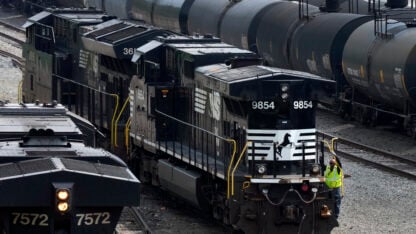Judge approves $600 million settlement in fiery Ohio derailment of Atlanta-based Norfolk Southern railroad

A federal judge on Wednesday approved a $600 million class-action settlement that the Atlanta-based Norfolk Southern railroad offered to everyone who lived within 20 miles (32 kilometers) of last year’s disastrous derailment in East Palestine, Ohio.
Judge Benita Pearson gave the deal final approval after a hearing where the lawyers who negotiated it with the railroad argued that residents overwhelmingly supported it, attorneys for the residents and railroad spokesperson Heather Garcia told The Associated Press. Roughly 55,000 claims were filed. Only 370 households and 47 businesses opted out.
Those who did object to the deal were vocal in their concerns that the settlement won’t provide enough and that the deal was rushed through so quickly that they can’t possibly know what the potential health impact from the derailment will be. They say it’s hard to know all the risks, given the way test results have been reported by the EPA and the fact that the lawyers haven’t disclosed everything they learned in their investigation.
The judge’s approval clears the way for payments to start going out quickly. The lawyers had previously said they hoped to get the first checks in the mail before the end of the year.
Anyone who lived within 2 miles (3.2 kilometers) of the derailment was eligible to get up to $70,000 per household for property damage plus up to $25,000 per person for health problems. The payments drop off the farther people lived from the derailment down to as little as a few hundred dollars at the outer edges.
When the train derailed late on Feb. 3, 2023, tank cars full of hazardous chemicals ruptured and spilled their contents that caught fire just outside the small town on the Ohio-Pennsylvania border. Then three days later officials decided to needlessly blow open five tank cars of vinyl chloride and burn the toxic plastic ingredient inside because they feared they would explode.








